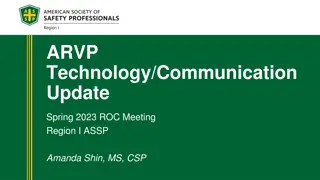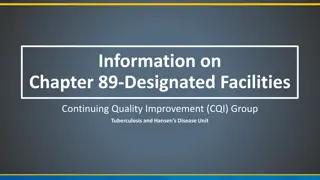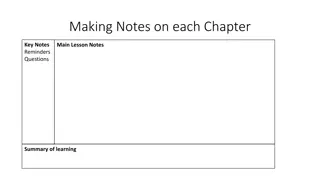
Nurse Educator Qualities: Essential Tips to Thrive
Learn essential qualities and tips for Nurse Educators and Nurse Managers to excel in the healthcare profession. Topics include preceptor training, adult learning principles, reality shock, rapport building, conflict management, and the first 90 days of a preceptor program.
Download Presentation

Please find below an Image/Link to download the presentation.
The content on the website is provided AS IS for your information and personal use only. It may not be sold, licensed, or shared on other websites without obtaining consent from the author. If you encounter any issues during the download, it is possible that the publisher has removed the file from their server.
You are allowed to download the files provided on this website for personal or commercial use, subject to the condition that they are used lawfully. All files are the property of their respective owners.
The content on the website is provided AS IS for your information and personal use only. It may not be sold, licensed, or shared on other websites without obtaining consent from the author.
E N D
Presentation Transcript
Preceptor Development Training Chapter 1 Introduction a. Review 10 Tips to Help You Teach Other Nurses Article b. Preceptor Qualifications c. Objectives of Preceptor Development Training Program d. Definitions Chapter 2 Adult Learners a. Learning Styles i. Visual, Auditory & Kinesthetic Learners b. Generational Characteristics & Learning Trends c. Teaching-learning Principles d. Characteristics of Adult Learners
Chapter 3 Reality Shock Chapter 4 Difference Between Preceptor & Staff Nurse a. Primary Role b. Recipient of Service c. Type of Service Provided d. Responsible for e. Workload Contribution f. Workload Priorities Chapter 5 Preceptor s Responsibilities a. Role Model b. Facilitator of Socialization c. Assessor of Learning Needs d. Planner of Learning Experiences e. Implementor of Learning Plans f. Evaluator of Job Performance a. Honeymoon Phase b. Shock Phase c. Recovery Phase d. Resolution Phase
Chapter 6 Preceptor s Rapport a. Working Effectively with Preceptees b. What Preceptors Should Do c. What Preceptor Should Not Do d. How to Manage Possible Problems in Preceptor-Preceptee Working Relationships Chapter 7 Conflict Management Chapter 8 First 90 Days of Preceptor Program a. Core Orientation & Competencies b. Mandatory Education c. Case Management Classes d. 3 Month Orientation Class e. Preceptor Pathways f. 90 Day Competency g. 90 Day Supervisory Visits h. 90 Day Evaluation
CHAPTER 1 INTRODUCTION 10 tips to help you teach other nurses Posted: February 25th, 2010 Health care is one of the fastest growing professions out there, but every day, prospective students are being turned away because of a lesser-known shortage: there aren t enough Nurse Educators to teach them all! As a nurse, you are already ahead of the curve if you re interested in becoming a Nurse Educator. After all, you already know most of the material. Becoming a nursing instructor is also a great way to change careers into something with more flexible hours, less physical strain, and better pay. Oh, and by the way, if you re a Nurse Manager, or aspiring to be one, you ll find these qualities apply to you, too! Sounds good, doesn t it? Read on for the 10 qualities that you ll need if you want to survive and thrive as a Nurse Educator and a Nurse Manager.
#10: Patience Patience is one of those obvious traits that is often surprisingly under-cultivated in teachers. Having patience both with students and yourself will create a more disciplined, more rational you. Patience can overcome anxiety, fear, discouragement and failure, which you can apply both to your own teaching style, but also impart to your students. How to get this coveted quality? Relax! You can immediately make progress by taking a few deep breaths and taking an extra 30 seconds to answer a student s question, make a diagnosis, or reply to an irate patient. Remind yourself that all things take time. #9: Emotional Intellect Part of a teacher s job is to help a student get through the course with success. Sometimes this means recognizing that specific students need extra help, and sometimes it means giving freer reign to a student who is doing especially well. Research tracking over 160 high performing individuals in a variety of industries and job levels revealed that emotional intelligence was two times more important in contributing to excellence than intellect and expertise alone. Emotional intelligence can help you discern what your students need, but it can also be a valuable tool to help you decide how to react in stressful teaching situations, navigate academic politics, and bond with students to give everyone a richer and more meaningful experience.
#8: Dedication There is no question about it: nursing is a tough job. To be a nurse, a person needs endless dedication and a real belief that they are changing the world. To see dedication in a teacher inspires the students and shows them that even through many years of nursing, that the instructor has not lost their spark. In some ways, teaching a future nurse the art of determination is even more important than teaching those basic nursing skills. By being an example of dedication, the instructor is able to teach a valuable lesson that will help students break into their chosen profession and stay there. #7: Adaptability Adaptability is a key skill for a Nurse Educator because no two subjects (and indeed, no two students) are alike. It s impossible to apply the same template to every type of situation with which you are presented. It is worth noting, however, that being adaptable does NOT mean being a pushover! The Nurse Educator must have a strict set of ethics and practices that demand hard work from their students, but these rules must be balanced by the recognition that you can always adjust things as you go along.
#6: Social Skills You don t have to be the most vivacious flower in the garden, but it does help as a Nurse Educator to be open and communicative, among other things. Basic social skills are important as a teacher, because you are a role model to your students. Emotionally we learn to manage strong feelings such as anger and show empathy for others, which can be helpful when managing difficult students. Ethically we develop the ability to sincerely care for others and engage in socially-responsible actions, which is of utmost importance when shaping the minds of future nurses. Behaviorally we learn specific communication skills such as sharing and turn-taking imagine a hospital without these skills, and you begin to realize how important they are. #5: Positive Attitude A positive attitude is helpful in any type of job, but is especially important when one is considering becoming a Nurse Educator. Positive thinking can bring happiness and levity and helps a person cope with the setbacks of every-day life. Especially when Nurse Educators find themselves dealing with the tedious minutia of academic life, filled with endless bureaucracy and regulations, a positive attitude can overcome even the worst day. Practice your own positive attitude by laughing at jokes, reading inspiring quotes, or simply writing down 10 things you re thankful for. It can make a huge difference!
#4: Critical Reflection Everyone makes mistakes, and if you re lucky enough to be a Nurse Educator, your mistakes will likely be pointed out to you in a large classroom full of people who expect perfection. Embarrassing, yes, but it happens to everyone. The key is to learn from it. And why stop there? Learn from everything that you do. Think critically about your actions, not just at New Years resolution time or in the therapist s office, but every day. Your job as a Nurse Educator is to be constantly learning. When you are looking in the mirror, you are looking at the problem. But, remember, you are also looking at the solution. #3: Confidence Teaching is a tough job, especially when your students are adults. After all, they have grown minds, so why should they listen to you? Your sense of confidence is what gives your students confidence in you. If you are constantly second-guessing yourself, you ll be a mess in the classroom even if you ve got 25 years of nursing experience under your belt. As they say, sometimes even the best nurses can t be Nurse Educators it takes a special level of confidence in your own talent and ability in order to teach others how it s done. If that sounds scary, well, that s because teaching can be scary. The good news? The more you start to teach others, the more you realize how much you still have to learn yourself. In turn, the more you desire further learning, the better teacher you become. The ability to recognize one s own opportunities for growth is of paramount importance. And when you finally realize that you re always a student (and like it!) that s when you re a real Nurse Educator.
#2: Humor You can t even THINK about being a Nurse Educator unless you have a sense of humor. With all the disgusting body functions, bad tempers, big egos and whirlwind pace of the nursing world, there s not a lot of tolerance for someone who can t handle it all in stride with a quick joke and a smile. Your students will appreciate it, and your stress levels (and the people you take your stress out on) will thank you. #1: Passion Passion, of course, tops the list. Simply put, if you don t want to be a Nurse Educator, then you will not make a good Nurse Educator. It s a difficult and challenging job that s not for everyone, but those who really love nursing and teaching will thrive. Passion shows through in all aspects of teaching: in the lesson plan, attention to detail, and especially in the attention paid to students. It s passion that really makes a great teacher.






















